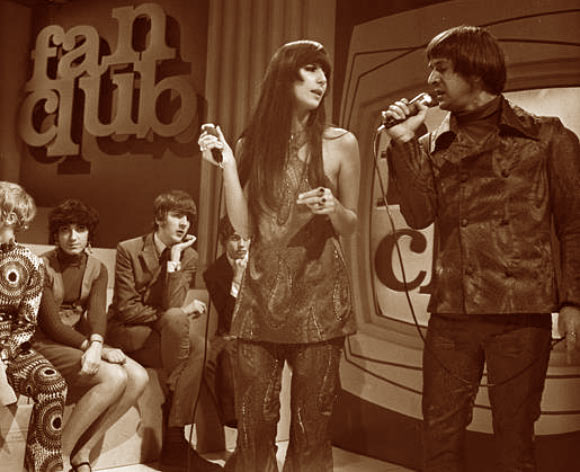An analysis of song lyrics from 1960 through 2008 reveals that male artists sing about both romantic love and sex more often than female artists. However, women sing about romantic love in a higher percentage of their songs. The results are published in the journal Sexuality & Culture.

Sonny & Cher performing the song ‘The Beat Goes On’ on Dutch TV program ‘Fanclub,’ February 4, 1967. Image credit: A. Vente / Beeld & Geluid Wiki / CC BY-SA 3.0.
Lead author Dr. Andrew Smiler, an independent researcher, and co-authors from Abilene Christian University and the University of South Florida examined sexual stereotypes in popular music lyrics across five decades.
They documented the presence or absence of a dating relationship, the word ‘love’ and its uses, sexual activity, and sexual objectification of females and males.
“Analysis relied on the Billboard year-end Top 100 songs of the year for 1960 through 2008,” the authors explained.
“The top 50 songs from every even numbered year (e.g., 1960, 1962, 1964, etc.) were analyzed, providing a sample of 250 songs per decade and 1,250 songs total.”
“Lyrics were found online, primarily from lyrics.com, as well as other sources,” they said.
“Artist information, including genre, was found at allmusic.com, which categorizes artists based on aspects of their musical composition, lists the full range of genres that an artist may be categorized in, and provides these in order of a performer’s most common genre.”
“A total of 895 unique primary artists performed these 1,250 songs.”
“328 were performed by a female solo artist or all female group (e.g., Diana Ross and the Supremes, The Pussycat Dolls), 827 were performed by a male solo artist or all male group (e.g., The Rolling Stones, Backstreet Boys), and 95 were performed by a mixed-sex group.”
“More than half of songs in the analysis were from the rock/pop genre, although its dominance decreased over time (particularly after 1990).”
“We believe this is the most exhaustive analysis of popular music lyrics conducted to date,” the researchers said.
According to the team, women are expected to focus on love and romantic relationships and have sexually objectified bodies, while men are expected to focus on sexual behavior.
The analysis showed that gender-based differences in sexuality are indeed common and consistent with gender stereotypes.
The scientists said: “71% of all songs referenced a dating relationship, including more than half of all songs in every decade.”
“57% of all songs used the word love, most frequently as a romantic term. This includes more than half of all songs in every decade except the 2000s (at 49%).”
“22% of all songs included a sexual reference, typically via metaphor (11% of all songs).”
“14% of all songs included sexually objectifying lyrics, with female bodies being objectified more often than male bodies.”
“More than half of all songs from the rock, R&B and other genres addressed dating and love; more than half of all songs from rap genre addressed sex and objectified bodies (and female bodies were objectified more than male bodies).”
“Among female performers, the proportion of songs referencing dating stayed relatively constant across five decades, 78-83%.”
“Among male performers, the proportion of songs referencing dating dropped over time, starting at 69% in the 1960s and falling to 59% in the 2000s, despite an increase to 78% during the 1980s power ballad era.”
“Among female performers, the proportion of songs referencing sex was at 6% in the 1960s, then jumped to 16-21% from 1970-2000.”
“Among male performers, the proportion of songs referencing sex jumped from 7% in the 1960s to 20-29% through the 70s, 80s, & 90s, then jumped to 40% in the 2000s.”
_____
Andrew P. Smiler et al. From ‘I Want To Hold Your Hand’ to ‘Promiscuous:’ Sexual Stereotypes in Popular Music Lyrics, 1960-2008. Sexuality & Culture, published online May 18, 2017; doi: 10.1007/s12119-017-9437-7







